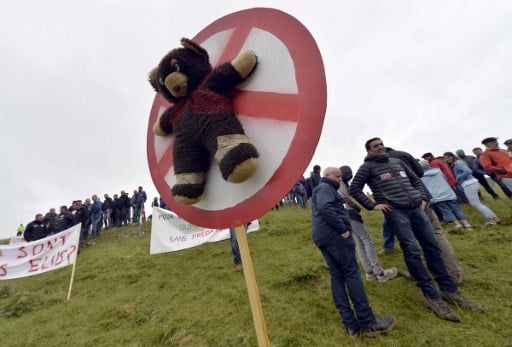The decision to bring the endangered bears back to the region was taken “without consideration for the lives of villagers and livestock farmers,” said Felix Bariain, head of the UAG farmers union in the Navarre region of northern Spain.
“We ask that the violent bears be removed from the Pyrenees,” he told AFP.
Media footage showed protesters carrying banners reading: “Bears, the ruin of the rural world” and “No to bears, safety for the Pyrenees”.
Félix Bariáin, durante la lectura fel manifiesto #paremoslamuertedenuestrasganaderias pic.twitter.com/LCm2sH8RYK
— UAGN (@UAGNavarra) August 22, 2019
They represented local farming unions and food cooperatives as well as France's main farming unions the FDSEA and Jeunes Agriculteurs (Young Farmers).

A file photo of bears playing next to their mother at the Aran Park in the Spanish Pyrenees' village of Bossost. Photo: AFP
Shepherds and farmers have been up in arms since the government brought in two more brown bears from Slovenia last October, the latest since France began to re-populate around 20 years ago a species that had been hunted to the brink of extinction.
More than 600 sheep have been killed this year in France, mostly after plunging off cliffs while trying to flee bears.
Around 50 bears now roam the mountains that separate France and Spain, mainly in France's Ariege region, where the herders' anger is especially fierce.
Local farmers say compensation is insufficient to staunch devastating financial losses.
Authorities say 214 requests for compensation were lodged in France in the first seven months of this year, up from 167 in the same period last year, and just 53 in 2015.
Environmental activists say the animals are integral to preserving a fragile ecosystem, and are emblematic of a French government plan announced in July to shore up biodiversity, which is under threat from human activity and climate change.
READ ALSO: Spanish brown bear wanders across border into Portugal, the first in 175 years



 Please whitelist us to continue reading.
Please whitelist us to continue reading.
Member comments